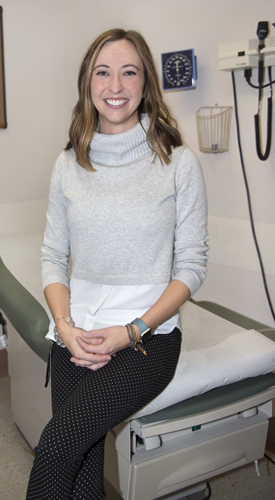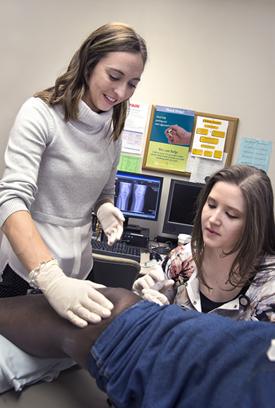VHA SimLEARN
SimLEARN musculoskeletal training designer named VA’s best physician assistant
By Gerald Sonnenberg
EES Marketing and Communication
SALT LAKE CITY, Utah – Andrea M. Barker, MPAS, PA-C, was named the 2016 Veterans Affairs Physician Assistant Association’s (VAPAA) Outstanding Clinical Physician Assistant March 1 at the VAPAA annual conference, held in Houston, Feb. 27 - March 3.
Barker is recognized for her work as co-director and developer of the VHA SimLEARN National Simulation Center Musculoskeletal Master Educator and Master Clinician Training Programs, and as a physician assistant and co-director of the Center of Excellence in Musculoskeletal (MSK) Care and Education at the George E. Whalen VA Health Care System (VAHCS) here.
Barker left a private orthopedic practice in November 2011 to perform primary care for Veterans in VHA.
“I wanted to make a larger impact on health care and felt that my experience and interest in MSK care would be valuable for Veterans suffering from chronic pain,” said Barker.
For three years, she had her own continuity clinic providing primary care to Veterans, in addition to her primary care MSK clinic.
“I thoroughly enjoy caring for Veterans. So many of them give their gratitude for the medical services we provide, and yet we need to ensure we thank them always for the services they provided for us,” she said.
Now as co-director of the Center of Excellence in Musculoskeletal Care and Education, alongside Director Dr. Michael Battistone, the Salt Lake City native is involved in creating, implementing and instructing the two main MSK educational projects focused on teaching primary care providers and trainees.
The first is called the MSK Intensive Education Week. This monthly, immersive interdisciplinary experience is for residents and students from health professions programs at the Salt Lake City VAHCS. The second educational program is called the MSK Training for Primary Care Providers, and it is an adaptation of a previously successful national program called the Mini-Residency in Musculoskeletal Care. This is a free continuing medical education program for current providers within VHA. Barker also teaches sessions on evaluating and managing shoulder and knee pain, as well as how to perform cortisone injections in these areas.
“In addition to my teaching responsibilities, I started a clinic called the Primary Care MSK Clinic, where I see patients who need an evaluation and, possibly, an injection,” said Barker. “After running this clinic for a year, I adapted it to include my colleague, Dr. Battistone, plus two rheumatology fellows, an internal medicine intern and a physical therapist. It is a valued clinical experience by our trainees where they can get high-volume supervised procedural experience. The patients also benefit because they can be seen for injections at the same clinic as their primary care provider, and are often seen faster than specialty care referrals.”
In her work with SimLEARN, Barker is co-lead of the MSK Master Program with Dr. Battistone. The mission of the SimLEARN MSK Program is to train educational leaders who want to develop local programs to strengthen MSK skills in primary care providers and trainees.
“We developed the two programs – Master Educator and Master Clinician – based on our programs developed out of Salt Lake City,” said Barker. “Musculoskeletal care includes problems of the muscles and joints in the body. The most common issues that are seen in primary care involve the shoulder and the knee, which is the focus of our educational programs at SimLEARN.”
During the training, clinicians are taught how they might implement MSK programs at their home institutions. They can start a program for trainees, similar to the MSK Intensive Education Week, or a program for primary care providers. Materials are provided for them to start these programs, and then they become part of a national group of educators where they can continue to improve MSK education throughout the VHA.
During the two-day MSK Master Clinician program, providers focus on cost-effective strategies to manage shoulder and knee pain in primary care. They also practice doing injections on simulation models so that when they go back to their home institution, they can perform observed injections on patients and become credentialed to perform them independently.
“This can especially help Veterans who receive care at VA community based outpatient clinics who would otherwise have to drive to a main VA campus to receive the injection. I have seen the local and national impact that our MSK programs and clinics can have on our nation’s Veterans, and I am optimistic that through these two SimLEARN training programs, we can continue those efforts on an even larger scale,” said Barker.
“I am proud to receive this national award because it showcases what we as physician assistants are capable of when given the opportunity,” said Barker. “The VAPAA serves our nations physician assistants and supports us so that we can provide the excellent clinical care for what we were trained.
“This award represents many years of late nights, hard work and sacrifice not just by me, but by my whole MSK team in Salt Lake City,” Barker added. “All of that work required an understanding and commitment from my family as well, caring for our young children while I was away. I am so fortunate for my family and coworkers who make all of this work possible.”

Barker (left) instructs a student during training. (VA photo by Tod Peterson)
____________________________________________________________________________________
EES partners with peer VHA program offices to design, develop, implement, evaluate and accredit quality education and training programs to improve outcomes in Veteran clinical care, health care operations and administration. EES also develops specialized learning content to equip VHA’s health care providers with the most current knowledge and skills to address the challenging needs unique to a Veteran patient population.



















